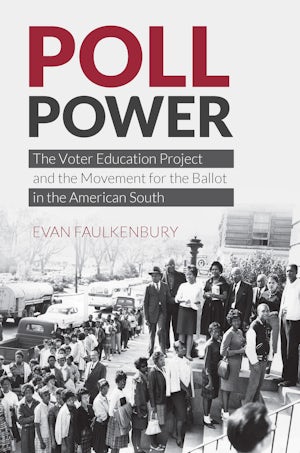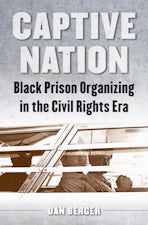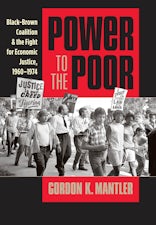Poll Power
The Voter Education Project and the Movement for the Ballot in the American South
By Evan Faulkenbury
216 pp., 6.125 x 9.25, 6 halftones
-
Paperback ISBN: 978-1-4696-5200-9
Published: May 2019 -
Hardcover ISBN: 978-1-4696-5131-6
Published: May 2019 -
E-book EPUB ISBN: 978-1-4696-5132-3
Published: April 2019 -
E-book PDF ISBN: 979-8-8908-5558-9
Published: April 2019
Justice, Power, and Politics
Buy this Book
- Paperback $29.95
- Hardcover $99.00
- E-Book $21.99
For Professors:
Free E-Exam Copies
Though local power had long existed in the hundreds of southern towns and cities that saw organized civil rights action, the VEP was vital to converting that power into political motion. Evan Faulkenbury offers a much-needed explanation of how philanthropic foundations, outside funding, and tax policy shaped the southern black freedom movement.
About the Author
Evan Faulkenbury is associate professor of history at SUNY Cortland.
For more information about Evan Faulkenbury, visit
the
Author
Page.
Reviews
"Successfully captures how the civil rights movement evolved from one of demonstrations to one that influenced and registered voters. . . . Faulkenbury excels at showing how interactions among organizations in the North helped fund activists in the South, and how the Tax Reform Act of 1969 undermined further progress and ultimately led to the end of the VEP."--Library Journal, starred review
“Faulkenbury’s groundbreaking work Poll Power examines the Voter Education Project (VEP). . . . [and] gives the reader insight into a lesser-known yet essential story of the civil rights movement. . . . Well-written and brief. . . . Poll Power is a necessary source for anyone wishing to know more about the inner-workings and financial underpinnings of voter registration efforts in the South.”--Arkansas Historical Quarterly
“Faulkenbury mines a wealth of archival sources, including a broad array of oral histories conducted with key players in voter registration efforts. He offers a concise, readable narrative that reminds us that successful social movements require both daring activists on the front lines and dedicated donors who can sustain the effort behind the scenes.”--North Carolina Historical Review
“With a focus on the southern regional efforts of the VEP, Faulkenbury employs a rich array of sources to offer a new perspective of the organization missing from accounts of the civil rights movement. . . . He deftly manages the exigencies of organizational and people’s history. . . . Weaving together the varied voices of leaders, officials, and grassroots activists.”--Journal of North Carolina Association of Historians
“Faulkenbury has written the long-overdue definitive history of the VEP.”--Journal of American History
“Offers an important and timely organizational history. . . . Poll Power provides insightful background on the people who created the VEP and reminds us of the powerful layers of resistance to Black voting.”--Journal of African American History




